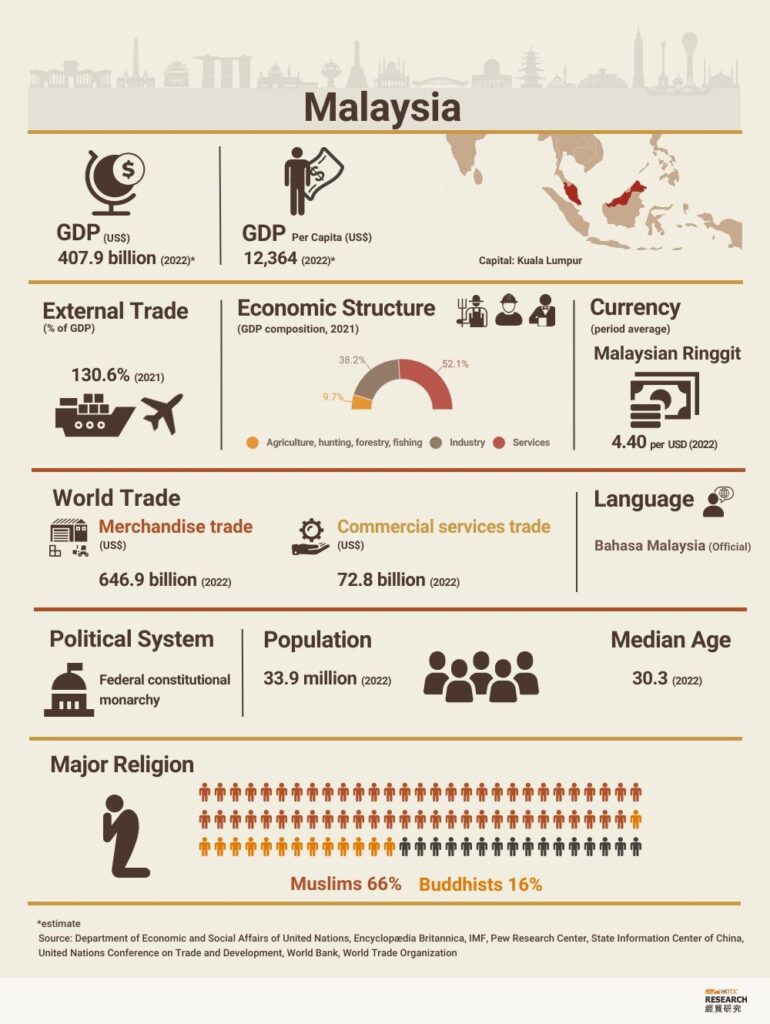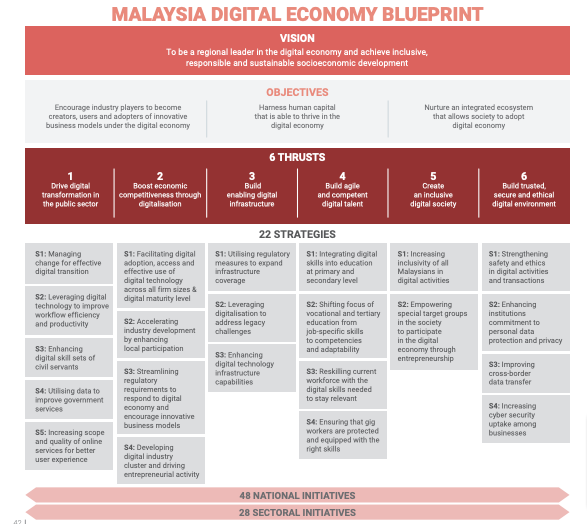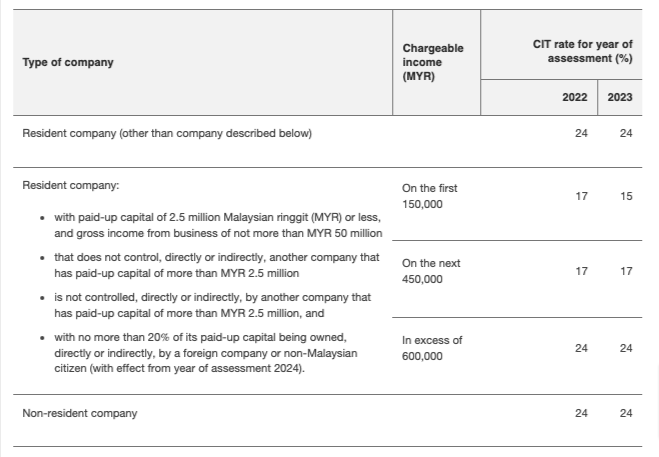Unemployment Rate in Malaysia
Doing business in Malaysia is impacted by the unemployment rate in the country. The unemployment rate in Malaysia experienced fluctuations due to the impact of the COVID-19 pandemic and economic challenges. The Malaysian approach to dealing with this has been working to recover from the pandemic’s effects, resulting in temporary job losses and increased unemployment. The Malaysian government has implemented various measures to mitigate these effects across industries and stimulate high-technology economic activities to create a competitive business environment, including job retention programs and stimulus packages to boost future employment and increase tax remittances from company profits and income tax.
Infrastructure and Connectivity
Malaysia offers excellent transport links, including modern airports, seaports, and road networks, providing easy access to regional and global markets. Major transport hubs like Terminal Bersepadu Selatan in the Klang Valley and Kuala Lumpur International Airport (KLIA) in Kuala Lumpur facilitate trade, tourism, and transportation between Malaysia and its neighboring countries.
The country’s extensive road and rail connections, including the KTM West Coast Line and the Malaysian East Coast Rail Link (ECRL), further enhance its connectivity. The Malaysia Digital Economy Blueprint also highlights the government’s dedication to transforming Malaysia into a digitally-driven, high-income nation and a regional leader in the digital economy powered by high technology.
Navigating the Legal and Regulatory Framework for Doing Business in Malaysia
A thorough comprehension of Malaysia’s legal and regulatory framework is key to a successful business venture in the country. From company registration to foreign investment regulations, navigating this landscape requires thorough knowledge and attention to detail. By adhering to the country’s laws and regulations, foreign investors can minimize risks and maximize opportunities.
Company Registration
Registering a company in Malaysia involves choosing the appropriate business vehicle, fulfilling registration requirements, ensuring the presence of all incorporation documents, and complying with reporting obligations. The Companies Commission of Malaysia (CCM) oversees the registration process, ensuring all necessary documentation is submitted and requirements are met.
Upon successful registration, businesses can enjoy the benefits of operating in Malaysia’s favorable business environment, ranked 15th worldwide for ease of doing business by the World Bank and International Finance Corporation (IFC).
Required company incorporation documents (for a private company) in Malaysia include:
Memorandum and Articles of Association (M&A):
- This document outlines the company’s objectives, internal regulations, and structure. It defines the roles and responsibilities of shareholders, directors, and officers.
Form 24 (Return of Allotment of Shares):
- This form reports the issuance of shares to initial shareholders and specifies the details of share allocations.
Form 49 (Return Giving Particulars in Register of Directors, Managers, and Secretaries and Changes of Particulars):
- This form provides information about the company’s directors, managers, and secretaries, including their names, addresses, and changes in their particulars.
Form 9 (Certificate of Incorporation):
- This is the official certificate issued by the Companies Commission of Malaysia (SSM) confirming the company’s successful registration. It serves as proof of the company’s legal existence.
Form 32A (Particulars of Directors):
- This form contains the personal details of the company’s directors, such as names, identification numbers, and addresses.
Form 24A (Statement by a Person or Persons not being a Nominee Company):
- This form is required when the initial shareholders are individuals, and it confirms their consent to act as company shareholders.
Form 44 (Notice of Situation of Registered Office and Office Hours and Particulars of Changes):
- This form provides information about the company’s registered office and any changes in its location or office hours.
Form 45 (Consent to Act as Secretary):
- This form is necessary when appointing a company secretary, including their consent to serve in that capacity.
Form 49A (Statement of Share Capital and Return of Allotment):
- This form details the company’s share capital structure, including the number of shares, their nominal value, and the names of shareholders.
Company Seal (Common Seal):
- While not a document, the company seal is an important part of company incorporation. It is used for affixing the company’s official stamp on documents to indicate their authenticity.
Please note that the specific requirements and forms may vary based on the type of business entity and any additional permits or licenses required for certain industries per the rules of local authorities, depending on the company’s anticipated economic activities (a company’s statutory declaration as to business purpose may determine which activities it can participate in). Companies may also have to pay a registration fee or subscribe to certain services tax payments. It’s essential to consult with the Companies Commission of Malaysia (SSM) or seek professional advice to ensure compliance with your business’s latest regulations and documentation requirements.
Foreign Investment Regulations
Foreign investors must navigate sector-specific regulations and restrictions on foreign ownership while taking advantage of available incentives and grants. In some sectors, there may be limits on the extent of foreign investment or requirements for minimum ownership by certain indigenous ethnic groups in Malaysia. For example, the foreign ownership limit for insurance companies is set at 70 percent, with higher limits considered on a case-by-case basis. By understanding and complying with these regulations, foreign investors can optimize their investments and ensure a smooth entry into the Malaysian market.
Getting to Know the Inland Revenue Board in Malaysia
The Inland Revenue Board of Malaysia (IRBM), also known as “Lembaga Hasil Dalam Negeri Malaysia” in Malay, is the government agency responsible for administering and enforcing the country’s taxation system. It operates under the purview of the Ministry of Finance in Malaysia. The primary role of the IRBM is to collect and manage various forms of taxation, including income tax, corporate tax, and indirect taxes like the Goods and Services Tax (GST) or Sales and Services Tax (SST), depending on the prevailing tax system in the country.
Key functions and responsibilities of the Inland Revenue Board of Malaysia include:
Tax Collection: The IRBM collects taxes from individuals, businesses, and other entities by the prevailing tax laws and regulations.
Tax Compliance: It ensures taxpayers comply with their tax obligations by filing accurate and timely tax returns and paying the appropriate taxes.
Tax Assessment and Auditing: The IRBM assesses and audits taxpayers to verify the accuracy of their tax declarations and assess any additional tax liabilities, if necessary.
Taxpayer Services: The agency provides taxpayers with assistance and information regarding tax matters, helping them understand their tax obligations and rights.
Tax Policy Implementation: The IRBM implements tax policies set by the Malaysian government, including changes in tax rates, incentives, and exemptions.
Tax Enforcement: It takes enforcement actions against individuals or entities that fail to meet their tax obligations, including imposing penalties, fines, or legal actions in cases of non-compliance.
Taxpayer Education: The IRBM conducts educational programs and initiatives to increase tax awareness and promote voluntary compliance among taxpayers.
Data Management: The agency manages tax-related data and records to ensure accurate and efficient tax administration.
The Inland Revenue Board of Malaysia is crucial in funding various government programs and services by collecting revenue through taxation. It contributes significantly to the country’s fiscal stability and economic development by ensuring that tax revenues are collected efficiently and fairly from individuals and businesses in Malaysia.
Embracing Malaysian Business Culture
Adopting the Malaysian business culture can bolster relationships and encourage cooperation. Understanding local customs and values becomes crucial for success in a business environment where respect, politeness, and teamwork are highly valued. By adapting to the nuances of Malaysian business culture, foreign investors can establish trust, enhance communication, and ultimately thrive in the Malaysian market.
Communication and Language
English is widely spoken in Malaysia’s business environment, making it easier for international businesses to communicate and operate. However, understanding local customs and language nuances can enhance communication and rapport.
In addition to English, Bahasa Malaysia, Chinese, and Indian dialects are commonly spoken, reflecting the country’s diverse cultural landscape. By being aware of these linguistic and cultural differences, businesses can effectively communicate with local partners and customers, fostering stronger relationships and better collaboration.
Building Relationships
Building relationships with Malaysian business partners and stakeholders requires patience, trust, and a genuine personal interest in understanding local customs and values. Establishing strong connections and gaining trust is essential for successful business operations. Malaysians prioritize politeness, consideration, and respect when conducting business. Maintaining face and avoiding embarrassment are also important cultural values.
Foreign investors can pave the way for fruitful collaborations and long-term success in Malaysia by investing time and energy in cultivating relationships.
Financing and Taxation in Malaysia
Financing and taxation play significant roles in Malaysia’s business realm. By understanding the various sources of capital and the country’s territorial taxation system, businesses can effectively navigate the financial landscape and optimize their investments.
The upcoming discussion will focus on various facets of financing and taxation in Malaysia, highlighting their implications for resident and non-resident businesses.
Access to Capital
Access to capital in Malaysia includes bank loans, government grants, and venture capital, with various incentives available for specific industries and projects. Top providers of business loans in Malaysia include Maybank, RHB Bank, HSBC, Bank Negara Malaysia, and the World Bank Group.
Prominent venture capital firms in the country, such as Gobi Partners, 1337 Ventures, and Cradle Fund Sdn Bhd, provide funding opportunities for businesses seeking investment. By leveraging these sources of capital, businesses can secure the necessary funding to expand their operations and tap into the vast potential of the Malaysian market.
Taxation System
Malaysia’s taxation system is territorial in nature. Corporate tax rates, incentives, and double tax treaties affect both resident and non-resident businesses. The corporate tax rate for all companies in Malaysia is 24%.





